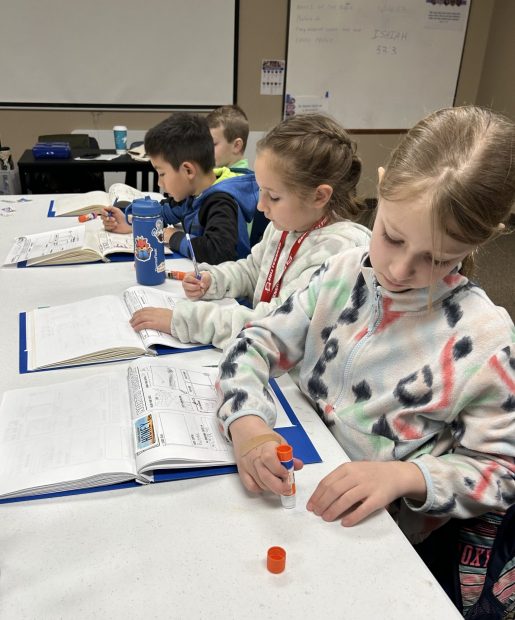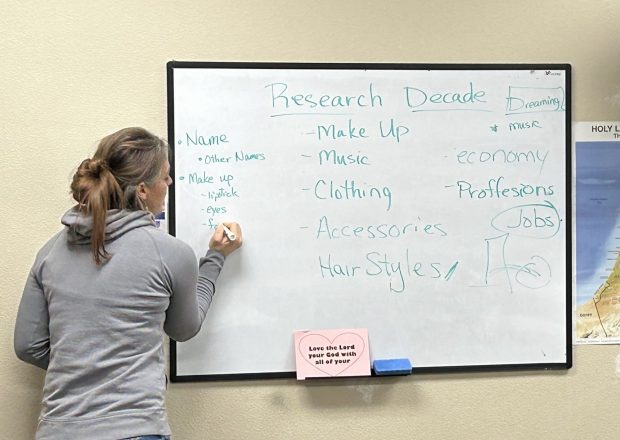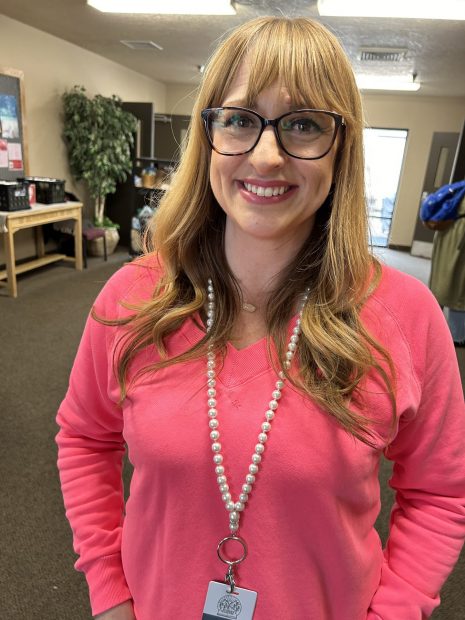
Monday mornings are busy at Bethel Church — parents are pulling wagons full of supplies, pushing strollers and ushering their five-year-olds through the busy parking lot.
More than 200 homeschool children from Parma to Boise descend on Excelsior Homeschool Families in Nampa every Monday for a day of group learning and social activities.
Amy Costa’s course about girls’ fashion history is planning a historical skit on May 10. Students will create characters wearing clothing and cosmetics to represent a specific decade in American history.
Costa’s lesson touched on the relationship between economy, clothing, food, makeup and music.
“What economy did your character live in? What profession did she have?” Costa asked.
Nine students brainstormed, collaborated and responded during class. “When did the fast food revolution happen and why?” Costa asked.
Costa’s students suggested that the pace of life sped up and the country desired more products, so more people joined the workforce and therefore the need for food on the go also increased.
“When ‘things’ became really important, jobs became important,” a student said.
Excelsior is a Christian co-op, or cooperative. The model is a collective way for homeschool families to contribute to the education of their children. They offer classes like STEM, math tutoring, debate or PE.
Interest is high and co-op groups are growing. There are more than 13 listed in the Treasure Valley, seven in North Idaho, four in East Idaho and four statewide.
Excelsior accepts up to 65 families but there are another 35 on its waitlist.

Last year in Idaho, 3,899 students left traditional schools for homeschooling, according to Idaho Department of Education records. It’s unclear how many total students in the state are homeschooled because there is no reporting procedure. In 2021, the U.S. Census Bureau reported that 10% of Idaho families are homeschooling their children.
The state doesn’t know the total number of homeschooled children but there are thousands walking away each year. The number leaving has fluctuated over the past four years:
- 2019-2020 — 2,865 students.
- 2020-2021 — 4,721 students.
- 2021-2022 — 3,928 students.
Parents use co-op courses to supplement homeschool curriculum. Each provide a niche service — some allow parents to drop off their kids; others provide more socializing time and less academics; many provide tutoring services; and some provide rigorous academic classes.
At Excelsior’s “These United States” course, elementary students pressed instructor Holly Desai about the state of Ohio.
“Why is the interesting fact missing?” said a girl in the front row.
“State motto: With God all things are possible,” Desai wrote on the board.
The class was relieved. Today’s craft activity and snack choice was related to the important state fact.
Students are divided into clusters: K-2, 3-5, 6-8 and 9-12. Classes start at 9:50 and end at 12:30, divided into three periods. Fifty-five different classes were offered — like sing to learn Spanish, SHEroes of the Bible, elementary physical education, intermediate ballet and STEM.
Chris and Kristin Take have four children enrolled. They pay about $220 annually to attend, plus Kristin volunteers in the kitchen or classroom. They chose to homeschool because the public school curriculum is not meeting their needs.

They attend Excelsior for a change of scenery, to sign up for elective classes, boost morale and to learn from other adult teachers and mentors, who all sign a statement of faith to represent God well.
“Character is far more important than education background,” said Tammy Wrightman, Excelsior’s director.
Before instructing children, a prospective teacher must be a co-op member for one year, which allows the group’s administrators and parents to observe their social interactions and ascertain if they’re ready to serve to students.
Background checks are mandatory for anyone over the age of 18 who will work with children.
“It’s awesome,” said Chris.
